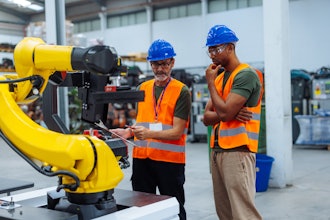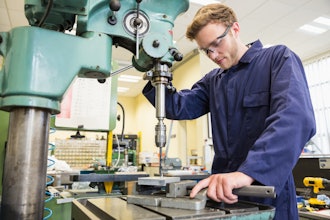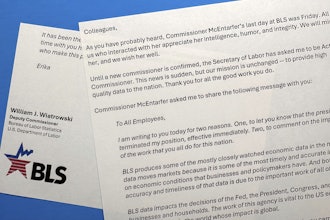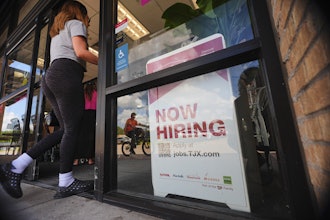Make no mistake: Manufacturers face a tough recruitment challenge. Faced with an ever-growing skills gap, many manufacturers are asking what the ‘future of work’ will hold for their organization—and, more importantly, how they can inspire workers to excel in tomorrow’s modern manufacturing environment.
Currently, 25 percent of the manufacturing workforce is over age 55, and by 2030, Gen Z will represent 22 percent of the U.S. labor force. With 2.6 million Baby Boomers expected to retire over the next decade and younger generations showing far less interest in manufacturing careers than those before them, workforce-related issues consistently—and justifiably—rank atop the list of operational concerns for manufacturers.
To succeed, your organization will need to balance the needs and motivations of a multi-generational workforce, which across many companies runs the gamut from Gen Z to ‘boomer. The key to embracing the future of work will be to embrace the future workforce—and to build an organization where employees are empowered by technology, inspired by their multi-generational peers, and motivated to unlock your company’s full potential.
What Motivates Each Generation?
Baby Boomers (age 50-69), for example, are motivated more directly by monetary benefits, promotions, peer recognition, and respect. Generation X (age 36-50) values work-life balance, recognition from the boss, and is motivated by bonuses and stock options. Millennials (age 20-35) aren’t that different; they, too, want stock options, flexible schedules, and time off, but also value mentoring and feedback. (Keep in mind, however, these motivations more accurately reflect an employee’s stage of life and will likely evolve as each generation ages up.)
Generation Z (under 19), on the other hand, is perceived as being difficult to manage, easily distracted by devices or social media notifications, and more likely to job-hop than those before them. However, the truth is this group works hard and wants to contribute—they have the potential to be one of the most ambitious and innovative generations in history.
For Gen Z, it’s less about the money and more about building strong social connections and relationships at work. Described by some as entrepreneurial and goal-oriented, they’re motivated by social or experiential rewards and recognition from managers, and often expect instant gratification. They want to be valued and it’s important for them to feel like they’re making a difference. Oh, and Gen Z definitely has high expectations when it comes to technology—but that’s to be expected from a generation born into our “always-on” society and raised as digital natives.
“Gen Z-Ready” Work Practices
Now the challenge for manufacturers in need of skilled workers today and in the years ahead will be to engage with Generation Z and gain their loyalty. Here are three “Gen Z-Ready” work practices for motivating and engaging the future workforce:
Create a culture of empowerment
Today’s manufacturing workforce needs empowerment, flexibility, and appreciation—but tomorrow’s workforce will expect it. Empowering your workforce means allowing employees to share ideas and opinions, encouraging them to be part of the improvement process, motivating them to work their way by supporting flexible schedules, and employing effective people managers who are invested in their teams’ performance and success. Transparency is a key component of this. Gen Z will expect employers to be honest and candid. They want to understand how their work impacts the company and like to see the results of their efforts. Manufacturers can empower Gen Z by connecting their work directly to business goals, providing them with a greater sense of purpose, and offering feedback and appreciation in real time.
Provide opportunities for career development
Gen Z is ambitious, but take time to understand their definition of success. They care about their career path and strive for advancement but will expect their employer to provide the training tools and mentorship opportunities that will help them succeed. Gen Z is thinking about their future: As new technologies and skills emerge, they want to know that their employer will help them attain the skills required to excel. Companies that offer leadership development programs and training certificates for current employees show a continued investment in their people, and this is an attractive benefit for Gen Z.
Integrate technology into the employee experience
Does your organization offer work tech that is easy to use? Can employees easily access their own personalized data (e.g. time-off balances, timecards, schedules, etc.)? Are you giving employees a tech experience that’s familiar to them? Technology is a key layer in the employee experience and investing in technology to modernize and mobilize the manufacturing industry for the next generation is a business-critical decision. Next generation, transformational solutions are needed to shape how the future workforce is managed. By giving employees the right tools and methodologies and empowering them with data to help make decisions that can drive innovation and business results, manufacturers can reach higher levels of engagement and achieve their vision of the future.
Recruitment Starts with Raising the Industry’s Profile
A report by the National Association of Manufacturers found only 17 percent of people view manufacturing as a top career choice. So, while employers across every industry face hurdles recruiting the next generation, manufacturers seemingly have a more difficult road ahead as they are challenged to overcome misconceptions about the industry. Another recent survey polled parents of Gen Z kids (under 18 years old) and found that few parents associate manufacturing jobs with modern workplace technology, artificial intelligence, or salaried work. They’re more likely to associate things like long hours, overtime, unskilled labor, and unfavorable working conditions with manufacturing—which potentially is why less than half (49 percent) said they would encourage their child to consider a future career in the industry.
However, armed with just a little bit of information about today’s modern manufacturing environment and the industry’s surging growth, strong economic outlook, and wide availability of high-paying jobs, the survey found that more than two-thirds of parents would encourage their Gen Z’er to consider a career in manufacturing.
It’s encouraging to know that raising the industry’s profile is possible if the future workforce and those who influence them keep an open mind—but that’s only half the battle. It’s up to manufacturers across the country and around the world to change public perception of the industry. Beyond offering development and training programs for current employees, some forward-thinking companies are engaging the next generation in middle school and high school, inviting students to tour their plant, experience modern manufacturing hands-on, and ultimately open students’ minds to all the opportunities a career in manufacturing offers.
Here’s the bottom line: If you take time to consider what motivates Gen Z and use that knowledge to inspire the next generation and build a multi-dimensional employee culture that appeals to your entire workforce—both present and future—you will find yourself well-positioned to overcome the growing skills gap and win the war for talent.























